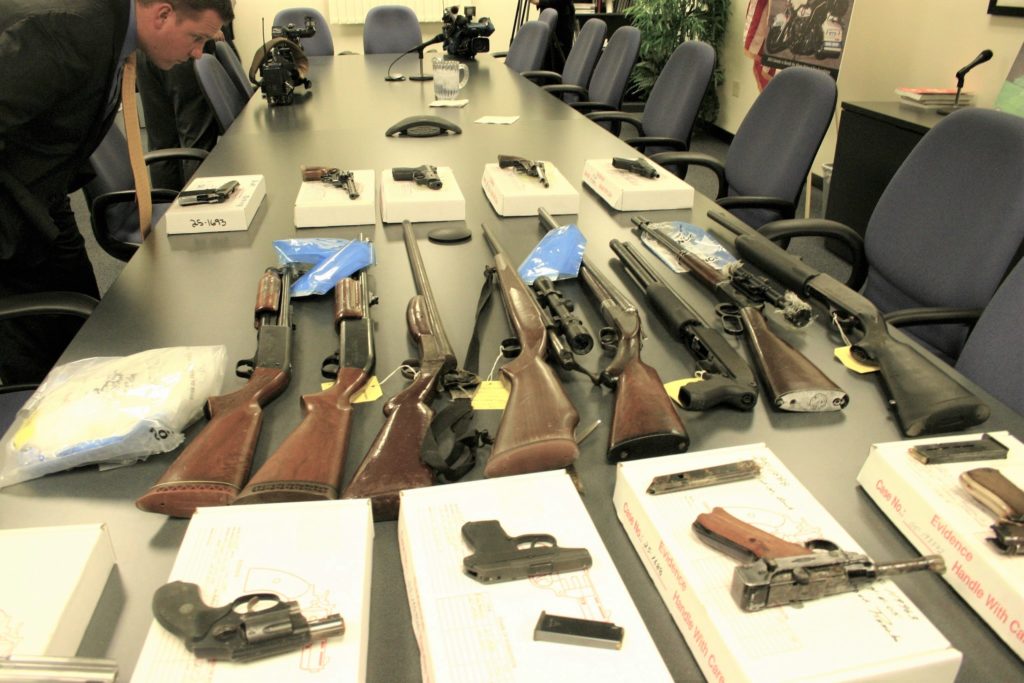
In one of its final acts of the legislative session, the state Senate and Assembly passed a package of 10 bills that further restricts gun ownership in New York, bans the sale of body armor to civilians and places new responsibilities on social media platforms to identify “hateful conduct” online.
The legislation was passed following several high-profile shootings, including the May 14 shooting in a Buffalo supermarket where 10 people were killed and three more were injured. The 18-year-old shooter allegedly discussed plans for a mass murder and suicide in 2021 — an incident that was known to authorities. Investigators say he specifically targeted Black victims during the May 14 shooting.
One of the bills passed by the State Legislature this week (A.10503 / S. 9458) requires that an individual obtain a license prior to purchasing a semiautomatic rifle. This is prospective and applies to purchases made on and after the effective date.
A person would need be 21 to purchase a semi-automatic rifle in New York state, under this law. The Buffalo shooter legally purchased a Bushmaster XM-15 “modern sporting rifle” and wore body armor and a military-style helmet when he carried out the shooting. No red flags appeared during the required background check when he purchased the rifle, despite his previous statement to a teacher that he wanted to commit murder and suicide, and undergoing a mental health evaluation.
The bill language does not explain the process to obtain a license. It would take effect 90 days after being signed by the governor.
Gov. Kathy Hochul — who is expected to sign all 10 bills quickly — referenced the Buffalo shooting, the Uvalde elementary school shooting on May 24 and a shooting at a hospital in Tulsa, Oklahoma on June 1 as justification for the new restrictions.
“Just last night a deadly semiautomatic weapon was once again used to mercilessly kill innocent civilians, this time at a medical facility in Oklahoma,” Hochul said Thursday. “It was a scene all too familiar in this country, one we’ve seen everywhere from Uvalde, to Sandy Hook, to Parkland, to my hometown of Buffalo. We cannot keep living like this.
“We cannot be satisfied by New York’s already tough gun laws. Shooting after shooting makes it clear that they must be even stronger to keep New Yorkers safe. This comprehensive package will close loopholes, give law enforcement the tools they need to prevent easy access to guns, and stop the sale of dangerous weapons to 18-year-olds.”
The legislation also expands who can file a risk protection order; the first step in taking guns from people deemed dangerous to themselves and others.
Bill A. 10502 / S. 9113-A expands who may file an Extreme Risk Protection Order petition to include health care practitioners who have examined the individual within the last six months; requires police and district attorneys to file ERPO petitions upon credible information that an individual is likely to engage in conduct that would result in serious harm to himself, herself or others; requires the State Police and the Municipal Police Training Council to create and disseminate policies and procedures to identify when an ERPO petition may be warranted.
The legislation would also amend the firearm licensing statute to make it clear that when an individual has been reported by a mental health practitioner and a county mental health commissioner has concurred with such practitioner that the individual is likely to engage in conduct that would result in serious harm to themselves or others, such report is considered in determining whether or not to issue a firearm license to the individual; and, expands the mental health practitioners who can make such reports.
Other legislation passed this week:
Bill A.7926-A / S.4116-A requires the New York State Division of Criminal Justice Services to certify — or decline to certify — that microstamping-enabled handguns are technologically viable and if certified as viable, to establish programs and processes for the implementation of such technology; and, establishes the crime of the unlawful sale of a non-microstamping-enabled firearm.
Bill A.10428-A / S.9229-A eliminates the grandfathering of large capacity ammunition feeding devices that were lawfully possessed prior to the enactment of the Safe Act or manufactured prior to 1994.
Bill A. 10504 / S. 9456 expands the definition of a “firearm” to include any weapon not defined in the Penal Law that is designed or may readily be converted to expel a projectile by action of an explosive. This is intended to capture firearms that have been modified to be shot from an arm brace, which are evading our current definitions of firearms and rifles.
Bill A. 10497 / S.9407-B makes unlawful the purchase and sale of body vests for anyone who is not engaged in an eligible profession. Eligible professions include law enforcement officers and other professions designated by the Department of State in consultation with other agencies. Also requires that any sale of a body vest be done in person.
Bill A.1023-A / S.4970-A requires all state and local law enforcement agencies to report seized or recovered guns to the criminal gun clearinghouse; participate in ATFs collective data sharing program; test-fire seized or recovered guns for national integrated Ballistic Information Network; and, enter the make, model, caliber, and serial number of the gun into the national crime information center.
The legislation also requires gun dealers to implement a security plan for securing firearms, rifles and shotguns; prohibit persons under 18 and not accompanied by a parent from the certain locations of a gun dealer’s premises; provide training to all employees on the conduct of firearm, rifle, and shotgun transfers, including identification of and response to illegal purchases; adhere to record keeping requirements; and require the State Police to conduct inspections of gun dealers every three years.
Bill A.6716-A / S.89-B creates the crimes of making a “threat of mass harm” and aggravated making a threat of mass harm.
Bill A.7865-A / S.4511-A requires social media networks in New York to provide a “clear and concise” policy regarding how they would respond to incidents of hateful conduct on their platform and maintain easily accessible mechanisms for reporting hateful conduct on those platforms.
Bill A.10501 / S. 9465 creates a new Task Force on Social Media and Violent Extremism in the Attorney General’s Office to study and investigate the role of social media companies in promoting and facilitating “violent extremism” and “domestic terrorism” online.









